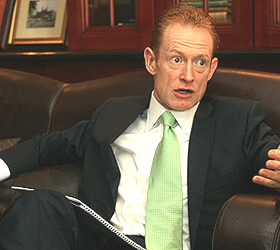 Walmart, the world’s biggest retailer, is close to agreeing a deal marking its first foray into Africa after bidding 16.5bn rand (£1.5bn) for control of South Africa’s Massmart.The deal, which has been agreed with Massmart’s board but needs shareholder approval, faces strong opposition from the South African retailer’s main union, which mounted a legal challenge to the takeover, threatened strike action and said it planned to participate in the competition review.Walmart, which owns the Asda supermarket chain in the UK, hopes to acquire 51% of Massmart, which operates 288 low-cost stores in 14 African countries. These sell products through a handful of retail brands, spanning construction materials to home appliances, most of which are based in South Africa.Andy Bond, chairman of Asda, who is responsible for operations in Africa, said acquiring Massmart would give Walmart a good platform to enter the continent and expand into some of its faster-growing, more politically stable countries.
Walmart, the world’s biggest retailer, is close to agreeing a deal marking its first foray into Africa after bidding 16.5bn rand (£1.5bn) for control of South Africa’s Massmart.The deal, which has been agreed with Massmart’s board but needs shareholder approval, faces strong opposition from the South African retailer’s main union, which mounted a legal challenge to the takeover, threatened strike action and said it planned to participate in the competition review.Walmart, which owns the Asda supermarket chain in the UK, hopes to acquire 51% of Massmart, which operates 288 low-cost stores in 14 African countries. These sell products through a handful of retail brands, spanning construction materials to home appliances, most of which are based in South Africa.Andy Bond, chairman of Asda, who is responsible for operations in Africa, said acquiring Massmart would give Walmart a good platform to enter the continent and expand into some of its faster-growing, more politically stable countries.
However, he insisted that Massmart’s direction would be set by the South African retailer’s existing senior management, who would remain in place and that Walmart’s involvement would simply “accelerate the current strategy”.”Massmart has historically grown through smaller scale acquisitions and may well continue to do so,” said Bond, adding that there could also be significant organic growth and, possibly, some larger acquisitions. Massmart expects to open up to 40 new outlets annually in the coming years, with an emphasis on countries such as Nigeria, Malawi and Zambia, where it already has a presence. Furthermore, Massmart is targeting new markets such as Senegal, Cameroon and Angola.”Walmart likes emerging markets and South Africa in particular is a genuine emerging market,” said Bond. Walmart is expanding into emerging markets to make up for a slowdown in the US, where like-for-like sales have declined for six quarters in a row, amid strong competition and a prolonged economic downturn.Bond said Walmart would help Massmart to significantly increase its food offering, which is presently largely confined to its wholesale operation, and will help expand the number of own-label products offered by the South African retailer.
“Our ambition is to reduce prices for our customers by buying better and operating better. We can help Massmart with its supply chain, distribution, IT, infrastructure and sourcing,” Bond said.Walmart’s negotiations to buy Massmart have not run entirely smoothly. In September, the two groups announced they were in talks in a deal that would have handed 100% of Massmart’s shares to its American suitor.However, Walmart has since scaled back its ambition after several Massmart investors said they wanted to retain their shares to tap into expected growth in South Africa and some of its key markets.In its announcement of the deal, which would be Walmart’s largest since buying Asda in 1999, the US retailer said institutional shareholders representing 35% of its shares had given irrevocable undertakings to approve the deal. Shareholders representing a further 15% had given non-binding support, added Walmart, which needs three-quarters of the votes for the deal to go through.
Walmart, which has long battled with trade unions in the US, pledged today to “respect and honour all pre-existing contracts with organised labour bodies” and insisted it would continue to use local suppliers and manufacturers.However, the South African Commercial, Catering and Allied Workers’ Union (Saccawu), which claims to represent about 70% of Massmart’s staff, said it opposed the deal as another step in the “Walmatisation” of the retail industry.A union spokesman said: “We have instructed a firm of attorneys to represent us in the legal process. As for strike action, this will be determined by the unfolding of the campaign and it shouldn’t be excluded.”Massmart’s retail brands include the discount chain Game, Builders Warehouse for construction and DIY, and DionWired, a home appliance retailer – Guardian











